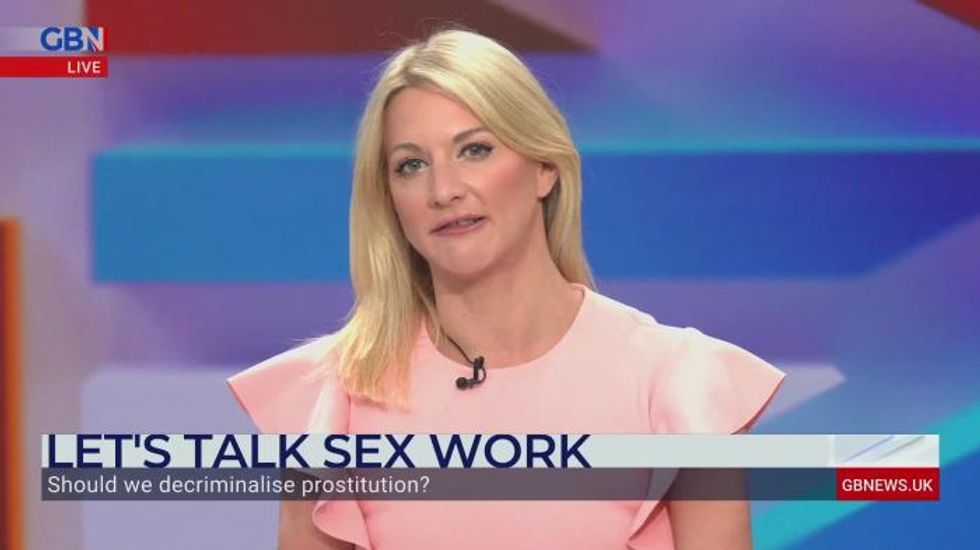Don't Miss
Most Read
Trending on GB News
There are few industries where women are in high demand and earn more than men. But when it comes to sex work, the vast majority of clients are male and the bodies on offer, often female. Prostitution is dubbed the oldest profession for a reason.
The power and leverage women throughout history have wielded through the medium of sex is well documented.
But should sex work be decriminalised? Is it right to punish either side of a consensual transaction between adults? Would regulating the industry enable those who choose to work in it to be protected, have regular health screenings, earn a good wage and lay out their limitations? Or would establishing red light districts as in the manner of Amsterdam lead to a normalisation of sex work that would put women at risk, invite trafficking and turn neighbourhoods into seedy, salacious and risky places?
Over 100,000 individuals are believed to work in prostitution in the UK, many of whom are doing so under duress.
When asked if they would like to leave sex work, 90 per cent of women said yes.
The routes to prostitution are complex, sometimes as a result of violence, abuse, trafficking and criminal activity, sometimes due to debt, homelessness, drug problems or psychological issues. Women who have chosen to sell their bodies for reasons of empowerment are few and far between and not typical of an industry that is often interwoven with other nefarious practices.
Most psychologists believe the long term mental health effects of prostitution are similar to those of rape and abuse, with three quarters of sex workers exhibiting signs of PTSD. Yet is it right to stigmatise an industry and tarnish all those who work in it as either damaged or traded, and those who use it as perverted or dangerous?
There are many anecdotes of clients seeking out sex workers for compassion or company, or perhaps finding intimacy while suffering from a disability.
There are also those in the business of selling sex who do not do so via intercourse but a range of other services or fetishes, who despise the term prostitution and find it inherently degrading.
The industry often comes with massive dangers, with half of sex workers worried about their safety and murder rates among prostitutes around 18 times higher than wider society.
Yet the average worker has around 25 clients per week paying £78 per visit according to statistics from the Home Affairs select committee, which would amount to almost £2000 a week, three times higher than the average UK salary, although many sex workers would testify against such a generous figure.
In the world of gay sex work, chemsex is a real risk where drugs are often taken by both sides, putting the male escort in an extremely vulnerable position.
Surveys of sex workers often reveal childhood trauma, sexual abuse and abandonment leading to serious safeguarding issues.
Few sex workers could truly be described as comfortable, autonomous and fulfilled.
Arguments abound that decriminalisation may actually help protect vulnerable sex workers, giving them the opportunity to access support services and receive guidance to quit the trade, while equally holding punters willing to exploit the industry accountable in order to try to prevent trafficking.
In recent years, several countries criminalised the purchase of sex while the European Parliament adopted a non-binding resolution which recognises prostitution as a violation of human dignity.
But decriminalisation is supported by the World Health Organisation on public health grounds and Amnesty International, which argues that criminalisation of sex workers makes an already disadvantaged group of people more vulnerable to violation.
Meanwhile some sex workers have complained that criminalising the clients pushes the industry underground and prevents them from pre-screening users by demanding personal details from them before transaction.
Here in the UK, soliciting and buying sex are both punishable by law. Meanwhile medical students have even lobbied the General Medical Council to not punish those propping up their studies working in the sex industry, with research in the BMJ showing that one in ten knew a fellow medic who had engaged in erotic dancing, prostitution or escort work to fund their course.
Is it a woman's right to choose and have agency over her own body?
Critics would argue that the normalisation of sex work by universities actually exacerbates systemic abuse of women.
Whatever the solution, one thing is evident - the fictional narrative of Hollywood blockbuster Pretty Woman where a glamorous young prostitute is swept off her feet by a handsome millionaire is about as far away from the truth as possible.
Today, we need to talk about sex work











